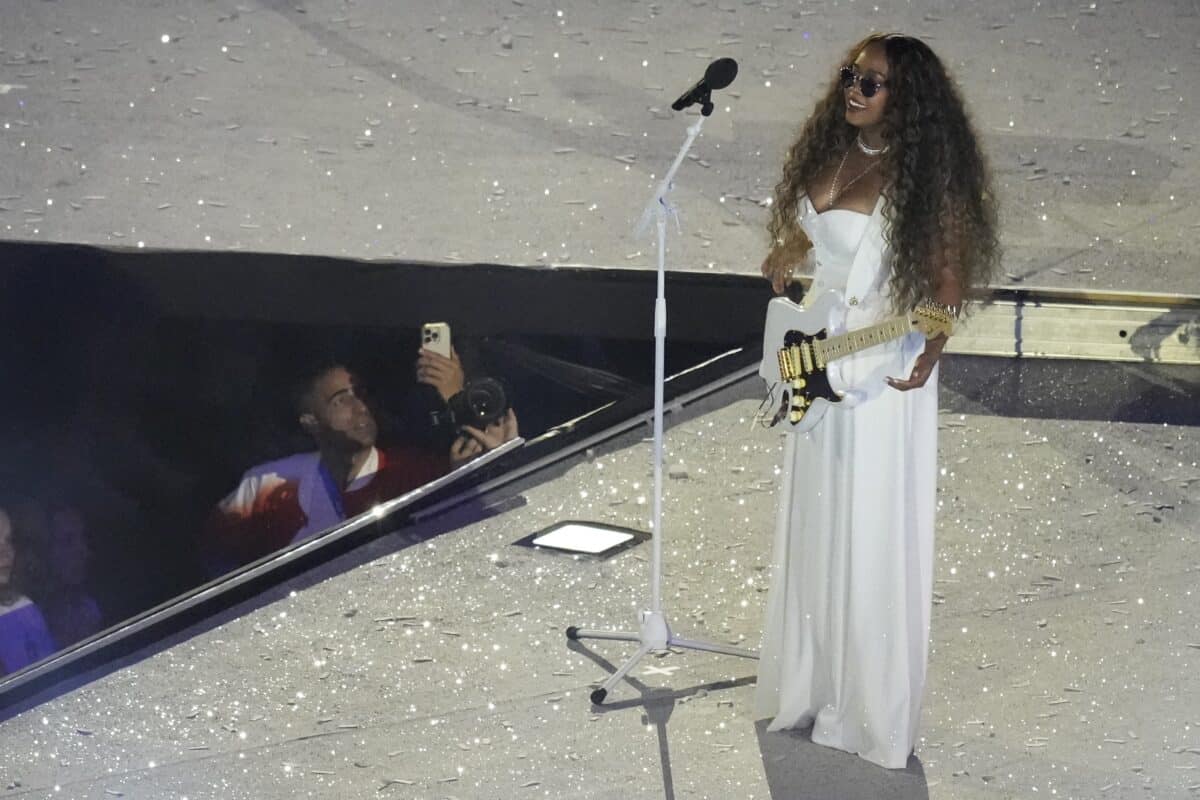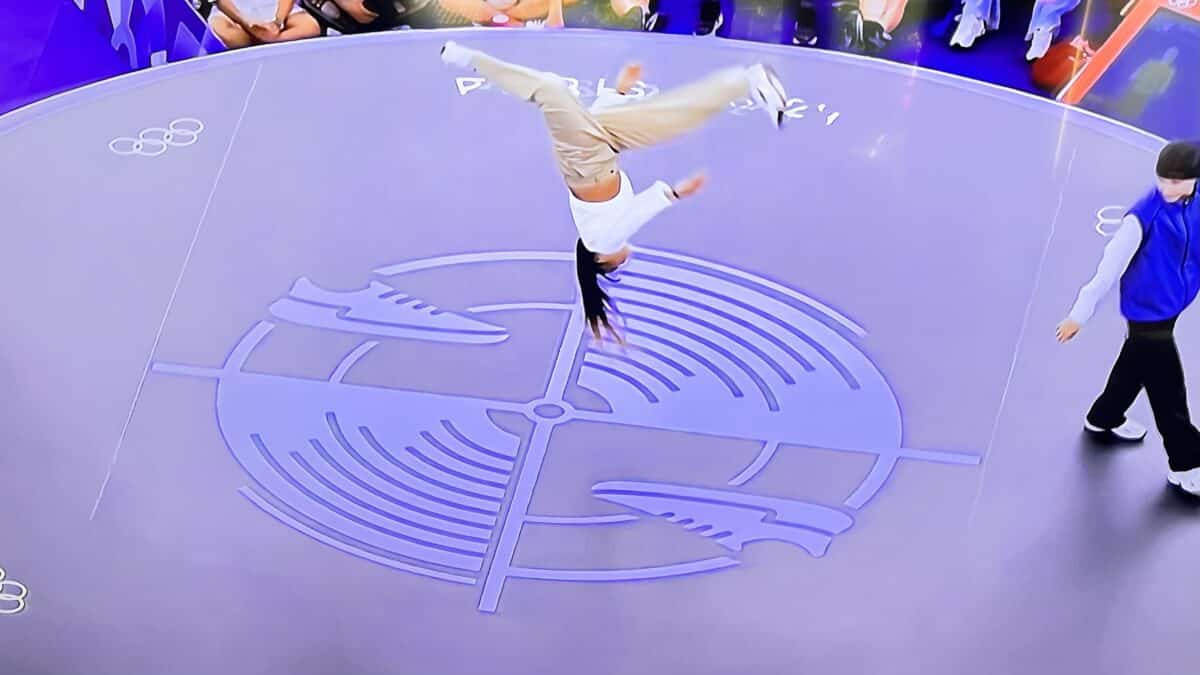Still savoring the Olympic finale. Plus: Breaking news—I love breaking!

H.E.R. performs during the 2024 Summer Olympics closing ceremony at the Stade de France, Sunday, Aug. 11, 2024, in Saint-Denis, France. (AP Photo/Rebecca Blackwell)
Consider this me just running through the tape. You know, the one at the finish line.
Yes, the Olympics is over, and California’s got next. In four years.
But there’s lots to savor from the last few weeks especially those closing ceremonies that included H.E.R., singing the “Star Spangled Banner,” our country’s national anthem.
It wasn’t a white male. It was H.E.R., the Asian American Filipino/African American pop star a/k/a Gabriella Sarmiento Wilson of Vallejo, Calif.
She was the face of America, welcoming the next games to a nation where in 2028, the country will be closer to what California already is, a minority majority state. Seeing the Filipino American multiracial singer was the extension of the theme that a world where people have a love interest in one another, plays well together,
You walk away not thinking medal count, so much as what we could share in the end. At world at peace beyond the Olympic zone.
After the pandemic morphed into all the current hostilities in the world, our need was indeed Olympian.
And where else but in an Olympics could we find that feel-good unity we so desperately crave.
We needed to see the world play with each other. Nicely.

H.E.R./CONTRIBUTED
The best Olympic media moment for Asian Americans?
Aside from the games themselves, digitally available wherever there was a peacock, for me, the best media moment has to be the power move by B-girl Logistx, a/k/a Logan Edra, 21, of Chula Vista, Calif.
The American Filipina was captured upside down on the front page of this past weekend’s Wall Street Journal. It’s the biggest picture, above all the newsy text, and deemed more important than anything else that day, including economic matters, Iran’s nuclear capability, even news of the Harris-Walz presidential blitz.
But Logistx was making history.
In a single frame, the photo with Logistx/Edra – in motion as she battled the fair-skinned Australia’s Rachael Gunn, a/k/a Raygun – captured the essence of the more than 30 men and women “throwing down” in Paris with the first-ever Olympic Breaking competition.
This was more than the antidote for all you who loathe rhythmic gymnastics. This was hip-hop culture evolving, earning big-time Olympic respect.

Logan Edra / CONTRIBUTED
Far from the day 50 years ago in the Bronx when breakers and their gangs would settle their arguments by putting a piece of cardboard on the sidewalk and battle an adversary, this was recognition of the virtues of urban diplomacy. (Maybe real-world politicos should take note. I’d rather see two opponents breaking than debating. Though maybe not Donald Trump, who seems to prefer Marathon Chats with Elon).
Breaking, which has held international competitions for decades, was finally “Olympicized” with a five-ring endorsement for its combination of athleticism and artistry.
This Olympics, I watched the other combative sports (Judo, Tae Kwon Do, wrestling and boxing). But I found only breaking broke through my ADHD-induced tedium.
It’s perhaps closer to gymnastics, but when you screw up there, it’s obvious. In breaking, you improvise your way out of a jam with style, and to the beat. You battle, then pose, and win on creativity and originality as you face the music picked right on the spot. And then you move on. Peace, love, out.
I found the Filipino American Logistx – so named because her father had to shuttle her to and from all her different after-school activities including dance – so mesmerizing. Maybe it’s because she looked like one of my relatives.
She was one of two Asian Americans breaking in Paris. The other was Sunny Choi, 35, from Queens, who graduated from Wharton and worked in corporate America. Clearly, she was breaking the model minority stereotype by being an Olympic B-girl.
The two men’s team members were Victor Montalvo (Mexican American from Florida) and Jeffro (an African American of Haitian descent from Houston).
Leave it to the ancestral home of breaking to feature a diverse team. And while Logistx didn’t win a medal, she did face and nearly beat an opponent who ultimately won silver. The Olympics tried to make the judging less subjective, but it is still based on opinion, making things as contentious as Olympic ice skating. Considering the judges are all veteran breakers, maybe they should throwdown to justify their scoring?
For the US, the only medal winner was Montalvo, who won bronze among the B-boys. Both inaugural gold medals went to Asians: Canada’s Philip Kim, a/k/a Phil Wizard, and Japan’s Ami Yuasa, queen of the B-girls.
That gave the competition an Asian flavor with so many of the competitors from China, Korea and Japan.
Liu Qingi, a/k/a 671, won the Bronze for China and sounded practically western in an interview: “Trust yourself, trust the process,” 671 told a reporter. “You should be yourself first, then you overcome so many problems.”
But what would the CCP and President Xi think?
I know some people may want to criticize the event as a full-on display of cultural appropriation. But it just shows how hip-hop is a global phenomenon, even universal. Breaking may have had its origins in NYC, but the whole world has taught us hip-hop is universal. Is it any different from how rock music evolved from the simple four-bar country blues? Or how America’s art form jazz is appreciated best from afar?
Breaking was the only event that I watched in its entirety. So imagine my dismay to hear it’s not coming to America in 2028. Other sports are debuting in Los Angeles, including flag football. But there is still time for all the committees to reconsider.
Someone lobby Snoop Dog now.
He kicked off the breaking event and was paid a reported $9 million to be everywhere at the Olympics from start to finish. And now he’s clouty with LA sway.
Other Olympic memories
Of course, I reveled when Filipino Carlos Yulo won the gold in floor exercise in men’s gymnastics, only the 2nd gold won by the Philippines ever (the first was weightlifter Hidilyn Diaz, who won gold in Tokyo.
As an American observer, I root for excellence, whatever its origins. But I marvel at the magic, which I saw a few times.
The Women’s 4×100 Relay had all the feels. It really began when Debbie Thomas passed the baton to anchor leg Sha’carri Richardson. Richardson’s phenomenal burst of speed was as exciting as it gets. Her glance back at a smoked competitor before breaking the tape was unforgettable.
Exciting too was the US sprinter Noah Lyles’ win in the 100 meter dash, in which an opponent’s leg crossed the line first, but it’s the torso that counts.
There were repeat winners like Filipino American fencer Lee Kiefer, already the first American man or woman to win gold in foil. Now she’s the first to win gold twice, making her one of the greatest fencers in US history.
And there was the competitor who dazzled us all in Tokyo four years ago, the Hmong American gymnast Suni Lee, who stepped up then to win Gold when Simone Biles had the twisties. In Paris, Biles was back and Lee was on the comeback trail battling illness to win two bronze and one gold this year. She also gained cred among Asians like me for appearing in a revealing ad about her eczema.
In basketball, has there been a more meaningful three-point shot for Stephen Curry than the one with 36.2 seconds left that secured the gold for the US men’s basketball team. The women’s gold was a miracle too, when France’s last three-pointer counted for just two, a foot on the line preserving the US team’s win as time expired.
And as a former soccer coach/girl dad, I was pleased to see the women win gold. (Trinity Rodman wore number 5, the same number as Tiffany Roberts, the Filipino American who was on the team that won gold in 1996).
But why, after watching the Olympics, am I not out shooting hoops or penalty kicks, dusting off my running shoes, or jumping on a pommel horse?
I am, however, on the lookout for a senior breaking class where they supply the Icy Hot.
And maybe a massage gun.
Like I said, in 2024, we all needed a hopeful, inspiring Olympics.
Emil Guillermo is a journalist and commentator. He writes a column for Inquirer.net’s US Channel. See him on YouTube.com/@emilamok1 or at www.amok.com
You may like: Fil-Am breakdancer Logan Edra looks back on her Olympics debut


